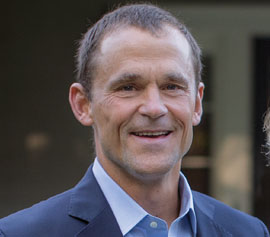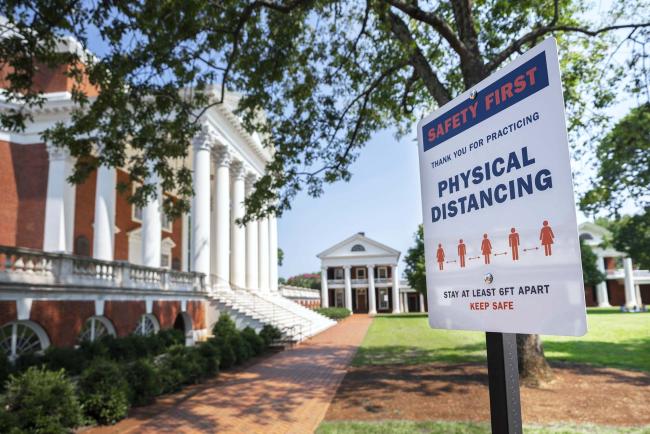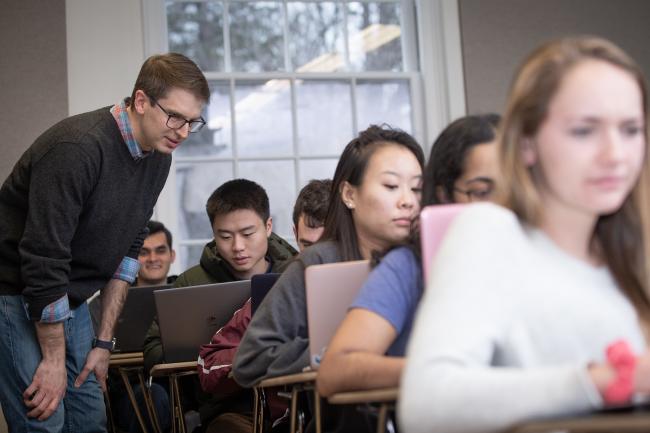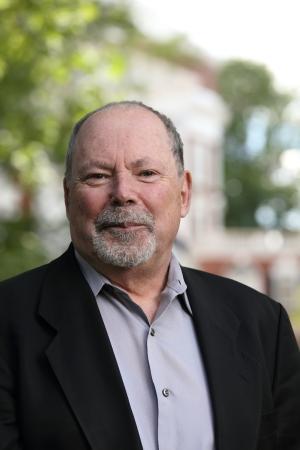Jim Ryan
Jim Ryan became the ninth president of the University of Virginia in 2018. He served as dean of Harvard's Graduate School of Education from 2013 to 2018. Ryan graduated first in his class from UVA's Law School and was a longtime law professor at the University.

When the Data Science Institute was launched, there were 11 schools at UVA. The newest was the Frank Batten School of Leadership and Public Policy, which formed in 2007. Before that, a new school hadn’t been created at the University since the 1950s.
Jaffray Woodriff had long wanted to see his alma mater be a national leader and pioneer in data science by creating a school dedicated to it. He previously donated $10 million toward realizing that vision, which helped launch the Data Science Institute in 2013. In the years that followed, he decided it was time for something bigger.
“I got more and more excited about the possibility of making a much larger contribution,” Woodriff said. “I could start to see that my idea of starting a school was being taken seriously.”
Ultimately, the Quantitative Foundation, founded by Jaffray Woodriff and Merrill Woodriff, would pledge $120 million, the largest private donation in UVA history, to create a School of Data Science at UVA, the first in the country.
While the historic donation from Woodriff unlocked the possibility of a school for data science, more work remained to turn it into a reality — in part because little information existed on how to move forward.
“The University doesn’t really have that much in the way of bylaws or guidance about how you form a school,” said Teresa Sullivan.
“We were kind of making it up as we went along,” she added.
With Sullivan’s term set to end on Aug. 1, 2018, they would also need the support of a new University president.
Jim Ryan would take over that month. While new to the role, becoming UVA’s president was a homecoming of sorts.
After graduating first in his class from the University’s School of Law, Ryan clerked for Chief Justice William Rehnquist. He then worked as a public interest lawyer in Newark, New Jersey, before coming back to UVA to join the Law School’s faculty, where he served for 15 years, including as academic associate dean from 2005-09.
He would eventually be tapped as dean of Harvard’s Graduate School of Education, holding that position from 2013-18, then returned to Grounds again — this time as UVA’s ninth president.
Ryan remembered his initial reaction when he first learned about the possibility of a school for data science at the university he was now poised to lead.
“I will confess, I was a little skeptical,” he said.
More specifically, he said: “I wanted to understand the benefit of having a school as opposed to having an institute.” The key figures behind the idea made a convincing case.
“I talked to Terry Sullivan a fair bit,” Ryan recalled. “And she was persuaded, as I ultimately was, that this was an important enough field that having a school dedicated to it made a lot of sense.”
He also spoke with Woodriff and Phil Bourne.
“Jaffray made the point that this will never get the attention it deserves, either internally, among students and faculty, or externally, unless there’s a seat at the table for data science — meaning, that there is an independent school and that there’s a dean of this school,” Ryan said. “And he was right.”
Meantime, Bourne sold Ryan on a vision for the new school, one that wouldn’t be siloed off from the rest of the University.
“Once I started thinking about it that way, it became incredibly exciting to me,” Ryan said.
“It was a different way of creating a school and a different way of interacting,” he explained. “And that’s what ultimately convinced me that this was the right way to go.”
The new president was on board, but considerable work remained to turn this vision into a reality.
In March 2020, the COVID-19 pandemic upended all facets of society, and its impact was felt deeply at colleges and universities across the country.
On March 11, all UVA classes moved online, with students encouraged to return home and President Jim Ryan informing the University community that “we will not be holding classes on Grounds for the foreseeable future.”
Like the rest of the world, the School of Data Science, which was not even six months old when the shutdown began, would suddenly be forced to make dramatic adjustments.
“Phil often said during that time, ‘Building a new school is hard; building a different kind of school is harder; building a different kind of school in the middle of a pandemic is damn near impossible,'” recalled Arlyn Burgess.
Burgess added, though, that the School, despite its youth, was well positioned to weather this unprecedented disruption.
“We had a huge number of resources at our disposal, and also, data science became so important so fast in the pandemic itself,” she said, citing interest in network models and predictive analytics to track the spread of the disease.
Additionally, the School’s recent creation of an online master’s program proved even more beneficial than could have been imagined when it was conceived.
“All the residential students went into that online program,” said Phil Bourne. “So the teaching part was affected, but not as affected as badly as it could have been.”
Still, for a school that was in its infancy, particularly one whose aim was to foster collaboration, the pandemic created unavoidable challenges.
“It’s very much dependent on how people are personally interacting all day, every day,” said Bourne of the conditions needed to create the culture the School was aiming for. “And when you lose that, and everybody’s just in a Zoom window, it really affects things. When I look back on it, I’m actually surprised we did as well as we did.”
For students like Melissa Phillips, it was not the conclusion to her one-year master’s degree experience that she imagined or desired.
“It was challenging and not the way we wanted to end things because we really wanted to have that graduation moment,” she said.
Nevertheless, she credited the School for how it handled an incredibly difficult period.
“I feel like the transition was easier because of all the support we got from faculty and staff,” Phillips said.
Even though it was far from a traditional commencement, Burgess did fondly recall the poignant video remarks Bourne recorded on the steps of the Rotunda to honor the first group of master’s students to graduate since the School of Data Science had been established the year before.
Burgess remembered the moving scene and the look in Bourne’s eyes during his remarks and what she knew it signified: “The people that are getting those degrees are the future of what data science is going to be.”
As the School grew, so too would its academic programs. The School of Data Science would achieve another milestone in this area in 2022 with the approval of a doctoral program.
In a release announcing the new program, Ian Baucom, the University’s provost, underscored what this development meant for the field itself: “Creating a Ph.D. in data science at UVA is another step toward using data to solve global problems.”
The full-time, residential program kicked off in August. Thomas Stewart, an associate professor who would join the faculty that fall, would eventually take the helm as program director.
In a video promoting the new Ph.D., Jeffrey Blume, associate dean of academic affairs, described what would distinguish UVA’s degree from others affiliated with data science but focused on statistics or computer science or some other related discipline.
“What makes our program unique is that we’re all in on data science,” Blume said. “We view ourselves as growing the next generation of data scientists.
In a year-end blog post, Phil Bourne reflected on this momentous moment.
“Our new Ph.D. in data science launched this academic year with 16 diverse students, all risk takers who have entrusted us with their careers,” he wrote. “We will not let them down.”
With the doctoral program approved, residential and online master’s degree offerings, and a very popular minor — which began in 2020 — all established, the School of Data Science lacked only one critical degree option to complete a full suite of academic programs: an undergraduate major.
In 2023 that moment would come. The State Council of Higher Education for Virginia in September approved a data science major. Current first-year students in the 2023-24 academic year would be eligible to apply that spring to join the program’s first cohort in fall 2024.
Describing the new major, Brian Wright, an associate professor of data science and director of the School’s undergraduate programs, said: “We’ve designed and are going to deploy a curriculum that is not seen anywhere else in the country.”
As for interest in the new major among students, there was little concern about that. The data science minor had become the most popular minor at the University, with more than 740 students enrolled from more than 50 majors by 2024, and the enrollment number continues to climb.
“It will be a popular major based on the demand that you’ve seen already from students,” said University President Jim Ryan.
Ryan also noted that the new undergraduate program would help further the University’s mission of serving Virginia and society.
“My hope is that not only will it enable students to be prepared to pursue a host of careers that we didn’t even imagine a decade ago, but also that we will prepare them to make a genuine contribution,” he said.
Adding a doctoral program in 2022 was another step toward expanding opportunities for students to pursue graduate work in data science as well as further illustration of the importance of advanced research in the field to the new school and the role that its academic programs played in that effort.
“I think that the synergy and virtuous cycle that exists between doing teaching and doing research is really important,” said Phil Bourne.
He further explained: “You’re not going to get research grants, you’re not going to do top-edge, leading research if you’re not current in aspects of data science. So, once you do that, of course, then you are obviously teaching those as well. And by teaching them, you learn more about them, and then you bring in students to help with the research.”
Don Brown, who was leading the School’s research portfolio as senior associate dean, had witnessed — and led — research efforts since the inception of the Data Science Institute when he was its first director. He noted some of the areas he was most proud of and his hopes for the future of data science research at UVA.
“The integrated Translational Health Research Institute of Virginia, or iTHRIV, I’m very happy about our creation of that because that has allowed us to do a lot of important research, including, most recently, the research that we’ve done into COVID,” Brown said.
He also cited the relationships built with the Schools of Medicine and Engineering as key partnerships. Looking ahead, he hoped the School would continue to build on these foundations and look for other areas where it can continue to expand its footprint.
“Work with the Environmental Institute is an up-and-coming area that I’d like to see us continue to grow and to build out in a number of ways,” Brown said, adding that he also hoped that cybersecurity could be a research focus going forward.
Jim Ryan, the University’s president, said the impact of the School of Data Science was being widely felt.
“You’re already seeing what I had hoped to see, which is that the School of Data Science is not just a value to the faculty or the students who are participating, but it’s a real value to faculty across the University.”
Ryan noted that the School’s reach also extended far beyond Grounds.
“We’re able to offer services to governmental units who are interested in data analytics to better understand the data that they gather — whether it’s the city of Charlottesville or the DMV or a state agency.
He added: “I think part of a public university’s mission is to serve the public, and the School of Data Science is already doing that.”
A key priority for Ryan, Bourne, and Brown had long been an emphasis on the notion of responsible data science, an idea that Bourne said included ethics but also goes further.
“It’s more than ethics — it’s justice, it’s policy, it’s law,” he said. This will be increasingly true with the continued evolution and expanded footprint of artificial intelligence in society and the governance questions this raises, key research priorities for many faculty members.
“I actually see that as an area where we could really excel because when it comes to public policy, when it comes to law, when it comes to the humanities, we are, undoubtedly, a leading university,” said Bourne.
Ryan explained that embracing an ethical approach to the use of data was central to his vision for the School from the outset.
“This can’t just be about the revolution in data and seeing how far we could go,” he said of what he wanted the mission of the School of Data Science to be. “It needed to, from the very beginning, be focused on all of the ethical issues that are related to the gathering of data, the analyzing of data, and the sharing of data.”
Brown, who was a key architect of the curricula and philosophy of data science at UVA from the beginning, underscored this idea.
“At the foundation, we always considered the ethics of big data, and now data science, to be a critical part of our structure,” he said. “It remains that way, and I’m very proud of that.”



